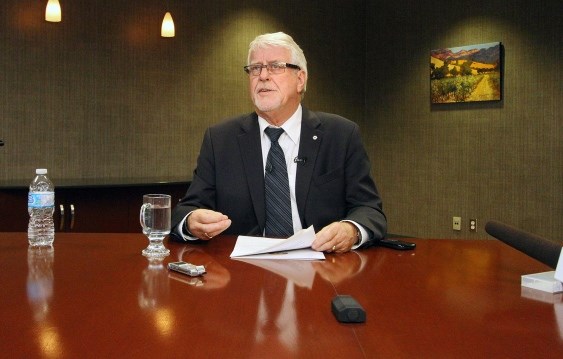B.C.’s health officer has declared a public health emergency in reaction to the increasing number of overdose drug deaths in the province that he says are on pace to exceed 700 by the end of the year.
Dr. Perry Kendall said the extraordinary step taken by his office will allow medical health officers throughout the province to collect more real-time information from various authorities to better prevent overdoses and overdose deaths.
That exercise will involve compiling data from hospital emergency rooms, paramedics, firefighters, police, health authorities, the B.C. Coroners Service and others involved in drug treatment and harm reduction services.
“This is, frankly, a crisis,” said Kendall at a news conference Thursday in Victoria, where he was joined by Health Minister Terry Lake and deputy provincial health officer Bonnie Henry. “These deaths have a serious impact on public health and the numbers are unusual and unexpected, which is the criteria for declaring such an emergency under the Public Health Act.”
Having current information on a spate of overdoses, or deaths, or type of drug involved, will help enhance efforts by outreach workers and other health care providers to identify patterns and target individuals and communities affected by overdose, he said, noting the logistics of collecting the data will be done over the days and weeks ahead.
The health minister noted there is a “lag time” in accessing information on overdose deaths. Lake said data received is primarily related to deaths and not overdoses, many of which have been linked to fentanyl, a synthetic narcotic 50 to 100 times more powerful than heroin.
More than 200 deaths this year
Kendall pointed out overdose drug deaths have climbed steadily in B.C. in the past six years. In 2010, there were 211 deaths. That increased to 474 last year, with 121 recorded in Vancouver. About one-third of total deaths were linked to fentanyl. More than 200 overdose deaths were recorded in the first three months of this year.
“At this rate, the total for 2016 could exceed 700, or even 800,” he said, noting the increases occurred despite what he described as “heroic” efforts by public health officials, emergency services workers, health providers and organizers of drug awareness campaigns.
Lake also recognized the efforts of health workers and highlighted the success of the B.C. Centre for Disease Control-led naloxone program, which has “reversed” 500 overdoses in the province since 2012.
More than 6,800 people are trained to administer naloxone, a medication that quickly reverses the effects of opiods such as heroin and fentanyl on the body by restoring breathing within two to three minutes. Some of those trained work in shelters and are members of drug users’ advocacy groups.
Vancouver and Surrey firefighters began administering naloxone this year and have used it a total of 17 times. The number of paramedics certified to use naloxone was also expanded this year.
“But while we’ve had great successes with our harm reduction strategies, the recent surge in overdoses and deaths over the last couple of years, really, is a huge concern for us,” Lake said. “And we have to do what’s needed to prevent future overdoses.”
Chief coroner's statement
B.C.’s chief coroner, Lisa Lapointe, issued a statement Thursday, saying she was encouraged by Kendall’s “additional focus on addressing the increasing numbers of overdoses we are seeing throughout the province, both fatal and non-fatal.”
Lapointe said data related to deaths is routinely shared with the coroners service’s public safety partners to support death and injury prevention measures. She said the coroners service will continue to provide such information, including results of toxicology tests in suspected overdose deaths, in “a timely manner.”
“We will also continue to work with our law enforcement, health, child welfare, First Nations Health Authority and education partners to look for ways to reduce the number of people dying from illicit drug use,” she said.
Vancouver Police Chief Adam Palmer welcomed Kendall’s announcement and said his department will share what information it can to help reduce overdoses and drug deaths.
“The VPD has very robust analytical capability, so when information requests come in – as long as it’s a lawful request – then we’re happy to help our health authorities and provide information to them,” said Palmer, noting his officers have conducted recent investigations in which they targeted drug dealers selling fentanyl and launched public drug awareness campaigns. “In the past, we’ve always provided information on deaths as a result of an overdose, as opposed to an overdose where somebody survives. So that’s the type of data that they’re going to be looking at.”
The VPD announced in February that officers investigated 11 deaths in a 16-day stretch believed to be a result of a drug overdose. Typically, two to three people per week die of a drug overdoses in Vancouver, the police said at the time.
Mayor Gregor Robertson said it was of “grave concern” to hear Kendall call a health emergency. He said the city will cooperate with health officers to help reduce deaths and overdoses. Vancouver is the only city in Canada with two legal supervised drug injection sites and developed the so-called four pillars drug strategy to help reduce the spike in deaths in the 1990s.
“We’re seeing the impacts and fatalities on our streets,” the mayor said. “We’ll be working with [Vancouver] Coastal Health to make sure we’re doing everything we can to support the efforts to bring those overdoses down and deal with the fentanyl – it’s prolific now in drugs on the street.”
@Howellings



